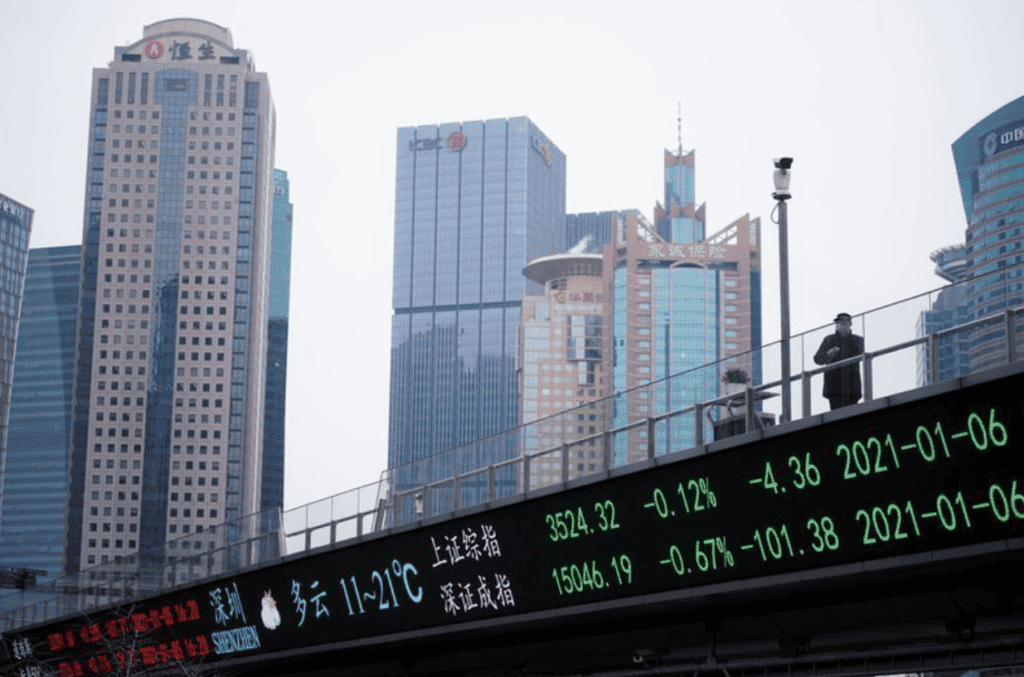
Global stock prices slipped and bond yields rose on Wednesday as investors braced for the prospect that Democrats could win both seats at stake in a U.S. Senate run-off election in Georgia, handing them control of the chamber.
Along with their narrow majority in the House of Representatives, a ‘blue sweep’ of Congress could usher in larger fiscal stimulus and pave the way for President-elect Joe Biden to push through greater corporate regulation and higher taxes.
Broadcaster NBC called one of the races for Democrat Raphael Warnock, unseating incumbent Kelly Loeffler, while Democratic challenger Jon Ossoff held a slim lead over Republican David Perdue in the other with 98% of votes counted. here
“With Biden proposing to reverse President Donald Trump’s tax cut, increase the minimum wage, and strengthen oversight on various industries, some might argue that his agenda is not particularly market-friendly,” said Vasu Menon, investment strategy executive director at OCBC Bank in Singapore.
Futures for the S&P 500 fell 0.8%, while Nasdaq futures shed 1.6% on fears Democrats could pursue tighter regulations on big tech firms.
Other industries, such as banks, oil and gas and healthcare, could come under heavier scrutiny, while infrastructure and alternative energy sectors could benefit.
Japan’s Nikkei fell 0.4% while MSCI’s index of Asian-Pacific excluding Japan erased earlier gains to trade flat.
European stocks are on course to rise in a catch-up with rebound in Wall Street shares overnight, with European stock futures trading 0.5 to 0.7% higher.
The 10-year U.S. Treasuries yield rose above 1% for the first time since March, on expectations of larger government borrowing under a Senate where Vice President-elect Kamala Harris would become a tie-breaker.
“U.S. bonds’ reaction reflects growing wariness about Democrats’ victory in the runoffs,” said Shogo Maekawa, global market strategist at JPMorgan Asset Management.
“It is also natural for stocks to fall near-term as there could be tax hikes and tighter regulations on big techs and so on. But on the other hand, there should be positive factors as well, such as more stimulus and further infrastructure spending.”
Vishnu Varathan, economist at Mizuho Bank in Singapore, expects the falls in shares to be short-lived.
“My suspicion is that the immediate knee-jerk reaction would be a slightly stronger dollar and a slight setback in equities, because people are still sizing things up,” he said. “I don’t think this is a trade that markets will continue to chase and extend.”
Shanghai stocks extended gains on Wednesday, with the CSI300 index rising 0.7% and reaching its best levels since 2008, shrugging off New York Stock Exchange’s chaotic handling of how it will treat Chinese companies to comply with sanctions set by the Trump administration.
The exchange made a second sudden U-turn as it says it is reconsidering its plan to allow three Chinese telecom giants to remain listed.
Oil prices held firm, maintaining their gains of nearly 5% made on Tuesday after Saudi Arabia offered to make voluntary cuts to its oil output.
Tensions following OPEC member Iran’s seizure of a South Korean vessel also frayed nerves, adding further support to the market.
Tehran denied on Tuesday it was using the ship and its crew as hostages, a day after it seized the tanker in the Gulf while pressing a demand for Seoul to release $7 billion in funds frozen under U.S. sanctions.
U.S. crude futures added 0.3% to $50.09 a barrel having climbed 4.9% on Tuesday.
International benchmark Brent crude futures rose 0.6% to $53.94.
In currencies, the U.S. dollar hit a new low before bouncing back on the prospects of the “blue sweep” in Georgia.
The euro rose to as high as $1.2328, a high last seen in April 2018, while the yen hit a 10-month high of 102.595 to the dollar.
Bitcoin rose more than 5% to hit a record high of $35,879.
























